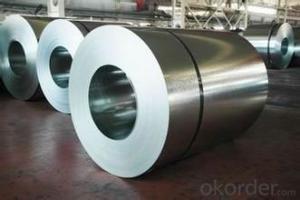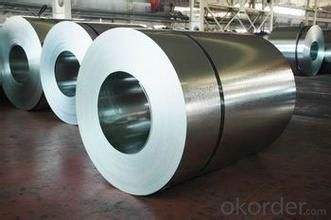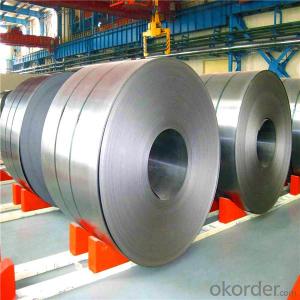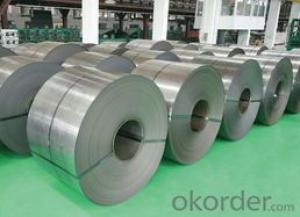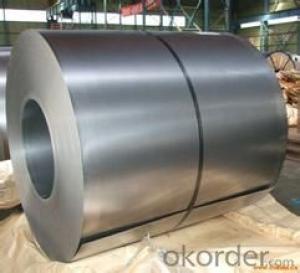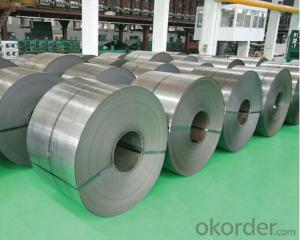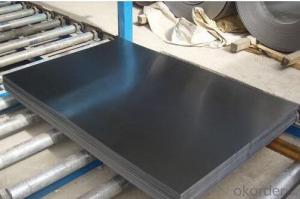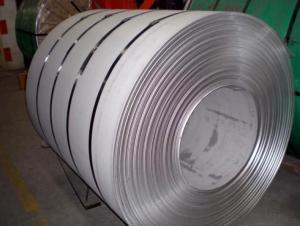Cold Rolled Steel Coil/Sheet Good Quality
- Loading Port:
- Shanghai
- Payment Terms:
- TT OR LC
- Min Order Qty:
- 100 m.t.
- Supply Capability:
- 10000 m.t./month
OKorder Service Pledge
OKorder Financial Service
You Might Also Like
1.Structure of Cold Rolled Steel Description:
The raw material of cold rolled steel coil/sheet is high quality hot rolled product, and after pickling continuous rolling, degreasing, annealing,skin pass,slitting and cut to length line etc. Along with it many kinds of new technology and new process of global cold rolling production have been applied. Therefore the quality of the goods could be guaranteed. The product is widely used in outdoor and interior decoration, furnishing manufacturing, home appliance, automobile etc.
2.Main Features of the Cold Rolled Steel:
• Excellent process capability
• Smooth and flat surface
• Workability, durability
• Excellent heat resistance performance
• High strength
• Good formability
• Good visual effect
3.Cold Rolled Steel Images
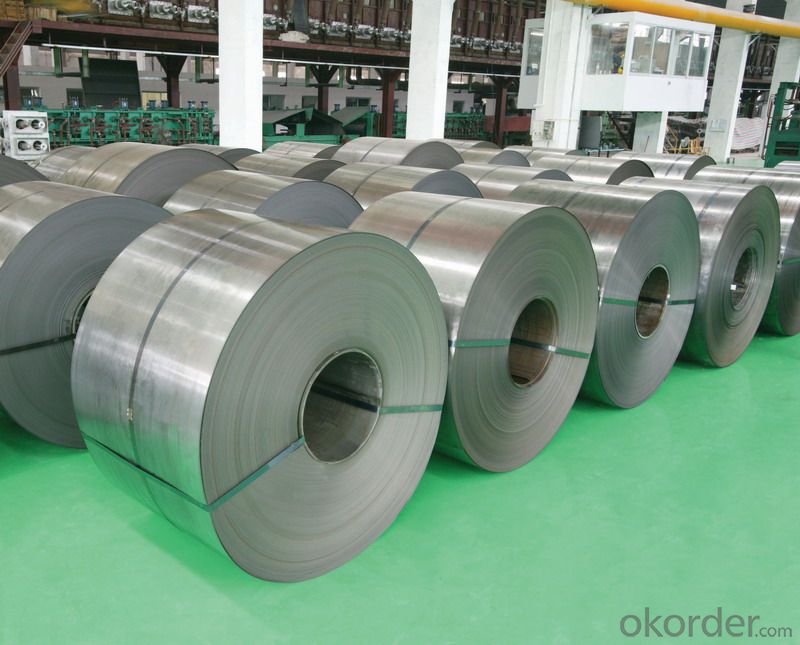
4.Cold Rolled Steel Specification
Standard:AISI,ASTM,DIN,GB,JIS,JIS G3302 ASTM 653M EN10142
Grade: Q195~Q345
Thickness: 0.16mm~1.5mm,0.16-1.5mm
Width: 1250,600-1250mm
Coil weight:3-12 MT
Coil ID:508/610mm
Chemical composition:
C | Si | Mn | Cr | Ni | P | S |
0.150 | 0.476 | 11.231 | 12.50 | 0.900 | 0.039 | 0.010
|
5.FAQ of Cold Rolled Steel
We have organized several common questions for our clients,may help you sincerely:
1.How about your company?
A world class manufacturer & supplier of castings forging in carbon steel and alloy steel,is one of the large-scale professional investment casting production bases in China,consisting of both casting foundry forging and machining factory. Annually more than 8000 tons Precision casting and forging parts are exported to markets in Europe,America and Japan. OEM casting and forging service available according to customer’s requirements.
2.How to guarantee the quality of the products?
We have established the international advanced quality management system,every link from raw material to final product we have strict quality test;We resolutely put an end to unqualified products flowing into the market. At the same time, we will provide necessary follow-up service assurance.
3. How long can we receive the product after purchase?
Usually within thirty working days after receiving buyer’s advance payment or LC. We will arrange the factory manufacturing as soon as possible. The cargo readiness usually takes 15-25 days, but the shipment will depend on the vessel situation.
- Q: How are steel coils used in the production of metal enclosures?
- Due to their versatility and strength, steel coils find extensive use in the manufacturing of metal enclosures. Typically made from high-quality steel, these coils serve as the primary raw material for producing metal enclosures. To begin with, specialized machinery is employed to unroll and flatten the steel coils to the desired thickness. This step ensures that the coils are suitable for further processing. Subsequently, the flattened steel is cut into specific sizes and shapes, according to the design requirements of the metal enclosure. Following this, various techniques such as bending, folding, and welding are utilized to mold the cut steel pieces into the desired shape. These processes enable the steel to be formed into the required dimensions and structure of the metal enclosure. The inherent strength and durability of the steel coils ensure that the final product is robust and capable of withstanding external forces or impacts. Moreover, steel coils can be coated with protective layers such as galvanization or powder coating to enhance their resistance to corrosion, rust, and other environmental factors. This coating helps to extend the lifespan of the metal enclosure while maintaining its aesthetic appeal. Furthermore, the use of steel coils in the production of metal enclosures allows for customization and flexibility. The coils can be easily manipulated to create complex shapes or designs, facilitating the customization of enclosures to meet specific customer requirements. This adaptability makes steel coils a preferred choice in industries such as automotive, electronics, and construction, where metal enclosures are widely used. In conclusion, steel coils are essential in the manufacturing of metal enclosures as they provide a strong and versatile raw material. These coils are transformed into the desired shape and size, ensuring the durability and functionality of the enclosures. With their customizable nature and protective coatings, steel coils offer a cost-effective solution for producing high-quality metal enclosures.
- Q: I felt that my nylon strings don't sound as good as steel ones. Is it okay that I replace them with steel ones, even if my guitar is classical? Thanks.
- Don't. okorder /
- Q: How are steel coils used in the production of oil and gas machinery?
- Steel coils are used in the production of oil and gas machinery to create various components, such as pipelines, storage tanks, pressure vessels, and drilling equipment. The coils are typically shaped and welded to form these structures, which provide the necessary strength and durability required for the demanding conditions of the oil and gas industry.
- Q: What are the common packaging methods for steel coils?
- The common packaging methods for steel coils include wrapping them with plastic or paper, securing them with steel or plastic strapping, placing them on wooden pallets, and using steel or wooden cradles for additional support during transportation.
- Q: Can steel coils be coated with vibration-damping materials?
- Yes, steel coils can be coated with vibration-damping materials. The application of vibration-damping coatings can help reduce the transmission of vibrations and noise, enhancing the performance and durability of steel coils in various applications.
- Q: I am looking at website on google based on the terms structural steel fabrication and simply steel fabricationI know that there must be a difference between the two terms, but it seems that many website authors use the two terms interchangeably.Do you know the key differences between the two terms?
- Structural steel is steel construction material, a profile, formed with a specific shape or cross section and certain standards of chemical composition and strength. Structural steel shape, size, composition, strength, storage, etc, is regulated in most industrialized countries. Fabrication, when used as an industrial term, applies to the building of machines, structures and other equipment, by cutting, shaping and assembling components made from raw materials. Small businesses that specialize in metal are called fab shops. Steel fabrication shops and machine shops have overlapping capabilities, but fabrication shops generally concentrate on the metal preparation, welding and assembly aspect while the machine shop is more concerned with the machining of parts.
- Q: What are the challenges in coil edge trimming for narrow strips?
- Coil edge trimming for narrow strips presents several challenges. Firstly, a major hurdle lies in maintaining accuracy and precision throughout the trimming process. It is imperative to achieve an even and smooth trim on narrow strips, requiring a high level of precision. Any deviation from this precision can result in uneven edges or burrs, which ultimately impact the strip's overall quality. Secondly, controlling strip tension poses another challenge. Due to their limited surface area, narrow strips are more susceptible to tension issues. This can lead to problems such as strip breakage or stretching, ultimately affecting the final product's quality. Furthermore, avoiding material waste is a crucial challenge. Narrow strips allow for less margin of error, meaning any mistakes during trimming can result in a significant amount of wasted material. Minimizing material waste is essential for cost-effectiveness and sustainable manufacturing practices. Moreover, maintaining a high production rate can be difficult with narrow strips. The trimming equipment must handle the high speed required for efficient production while still maintaining accuracy and precision. This necessitates the utilization of advanced machinery and technology to ensure smooth and efficient operations. Lastly, the handling and transportation of narrow strips also present challenges. Due to their small size, narrow strips are more prone to damage during handling and transportation. Implementing proper care and handling techniques is vital to prevent any potential damage that could compromise the final product's quality. In conclusion, the challenges in coil edge trimming for narrow strips revolve around precision, tension control, material waste, production rate, and handling. Overcoming these challenges necessitates the use of advanced technology, skilled operators, and meticulous attention to detail throughout the entire process.
- Q: With the Reduced weight of steel,wouldn't the projectile be at a much higher velocity when fired causing more damage?I mean l couldn't steel be worked to seal the bore,not damage the rifling and still cheap enough to mass produce,and be light enough to carry much more ammo.
- As others have mentioned, steel lacks the ductility to conform to rifling and seal the bore. Cannon projectiles, which usually are made of steel, overcome this problem by using one or more driving bands of softer metal, usually brass or bronze, but sometimes even plastic, on the circumference of the projectile, usually close to the base. The body of the projectile rides on the lands, while the driving band fills the grooves, seals the bore and imparts the stabilizing spin to the projectile.
- Q: Well actually I was just wondering why people were bashing on stainless so much for katanas. I heard that they don't hold their edge as well as carbon steel blades or Damascus steel. So what makes it so inferior to carbon or other types of steels?
- No real swords are made of stainless steel. Its is simply a poor material for swords. Only kitchen knives that are required to be easy to clean and corrosion resistant are made of stainless. Adding chromium and other trace elements adds nothing to the ability to cut well or hold an edge. It is not strong enough to withstand the forces involved, being too brittle and lacking in toughness. Those decorative swords are not really swords at all.... rather they are sword shaped objects.
- Q: ...particularly for jewelry?
- Stainless steel is steel with lots of carbon in it. The amount of carbon gives it a so called grade. Marine grade, surgical grade etc.
Send your message to us
Cold Rolled Steel Coil/Sheet Good Quality
- Loading Port:
- Shanghai
- Payment Terms:
- TT OR LC
- Min Order Qty:
- 100 m.t.
- Supply Capability:
- 10000 m.t./month
OKorder Service Pledge
OKorder Financial Service
Similar products
Hot products
Hot Searches
Related keywords
